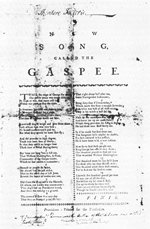'Twas in the reign of George the Third, Our public peace was much disturbed By ships of war that came and laid Within our ports, to stop our trade.
2
3
4
5
6
7
8
|
10
11
12
13
14
FINIS |
| Of the author of this song, Judge Staples says, in his Documentary History of the Destruction of the Gaspee; "He richly deserves the thanks, not only of his contemporaries, but of posterity; not so much for the sweet poetry of his song, as for the ballad shape in which he invested the. transaction. Undoubtedly some tune was found at the time to match it, notwithstanding the limping gait of some of the stanzas; and as it was sung in the circle of boon companions, they recalled the light of the burning Gaspee to their recollection, and hailing it as being, what subsequent events have shown it to be, the dawning light of freedom, whose mid-day effulgence now overspreads the land." |
| See More Thoughts on this Gaspee "Song" |
| Back to Top | Back to Gaspee Virtual Archives | Back to gaspee.com |
 Virtual
Archives
Virtual
Archives